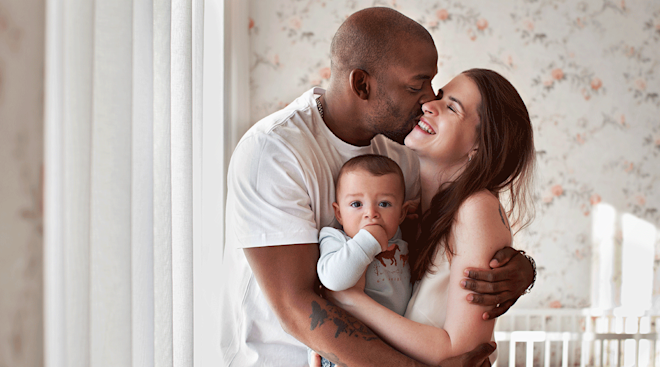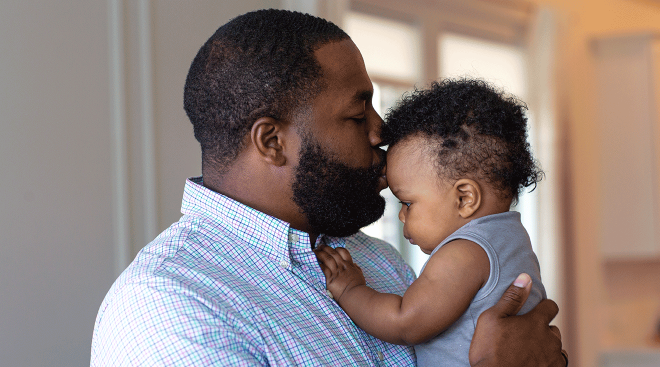A New Parent’s Guide to Getting Life Insurance
When baby arrives, you can’t help but dream of the future and all the joy it’ll bring. The last thing you want to be thinking about is the possibility of your family needing to use your life insurance policy. But if you haven’t purchased life insurance yet, it deserves a top spot on your to-do list. Think of it as a hedge against anything bad happening that could derail the plans you’ve imagined for you and your loved ones. Here’s what you need to know about getting life insurance when you become parents.
Life insurance is a contract between you and an insurance company that guarantees a payout of money—a so-called death benefit—to your beneficiaries in the case of your death. The point is to have it replace your income if you die, so your family can continue living the way they do now.
“Once new parents add up all outstanding debts plus all the funds they need to usher their kids into adulthood—healthcare, childcare, school fees, camp fees and college tuition, plus all the day-to-day costs like clothes, food and diapers—and then factor in their assets, they’ll see an amount they don’t have ready access to,” says Logan Sachon, insurance editor at Policygenius, an online marketplace where you can compare prices from multiple insurance carriers.
“When considering life insurance, the big question you need to think through is, what would happen to your family if you died tomorrow?” Sachon says. “It’s a macabre question, but it’s the beginning of the road when you’re deciding how much life insurance you need.”
One of the biggest benefits of life insurance is the influx of cash it provides your partner and kids if you die. Another upside: its favorable tax treatment. Unlike any money you take out from most of your retirement plans, life insurance policy payouts are generally income tax free. Also, with whole life insurance plans, your money grows without the IRS touching it, and any money you borrow from the plan isn’t subject to taxes (up to the amount of your monthly premiums).
The main disadvantage of life insurance: It can be expensive. Also, if you cancel your term life policy or it expires before you’ve used it, you won’t be able to get any cash back—unless you purchase a return of premium plan, which can be up to five times as expensive as a regular term policy. For whole life (skip down to read about the different types of life insurance), it can take decades for the policy to build up any significant cash value, and it won’t be more than what you paid into it. And last but not least, picking the right policy can be complicated and overwhelming. So we’re making things just a little easier. Keep reading for a breakdown of the various types of life insurance options and how to figure out how much insurance your family actually needs.
There are dozens of life insurance plan options out there, so your best bet is to talk them through with a financial advisor. But you can start by weighing the pros and cons of the two main types of life insurance: term versus whole life insurance policies.
Term life insurance offers coverage for a set period of time—however many decades you think it will take for your family not to be dependent on your income—and whole lasts your entire life. The key takeaway: Term is much cheaper and more straightforward, but when it expires, so will your coverage.
Term life makes the most sense for most people, Sachon says. “It costs 6 to 10 times less than whole life insurance, so that’s reason enough for more people to choose term,” she says. “But beyond that, term makes the most practical sense too.” That’s because as long as you pay your premiums, your family will collect the death benefit if you die during the term.
On the other hand, whole life insurance can be good for very high-income parents with lots of assets who have already maxed out their contributions to 401(k)s, IRAs or Roth IRAs. With whole life, you never have to worry about losing your safety net. It also has a savings component where its cash value can accumulate over time. Depending on the policy type, the savings vehicle might act more like a mutual fund or a savings account. According to Policygenius, your monthly premium payments are split between the death benefit and your cash savings, and over time, the former shrinks and the latter grows until the policy consists entirely of the cash value. That money can be used for a bunch of different things, like taking out a loan, paying for the policy itself or covering the estate tax so your kids can receive their full inheritance.
There’s also the option to go with an adjustable life insurance plan—a hybrid of term and whole life. The big benefit here is flexibility. If you’re not sure how much coverage you think you need and you’re worried about getting locked into a contract, an adjustable plan lets you alter your timetable of protection, the face value and how much you pay each month. You can decide to up or lower the payout and premiums can be reduced or increased.
The best way to figure out how much life insurance you need—aka the amount of money you want your policy to pay out to your family—is to figure out how much they’ll need to maintain their standard of living. You’ll want to evaluate your assets, debt and any other fees like college expenses you think your family will face down the line. Even if you don’t generate an income, consider the things you handle now that could cost money in the event of your death. “Even a non-working spouse may need some coverage if the family’s budget is dependent on that spouse’s domestic labor and childcare,” Sachon says.
According to Policygenius, people in their 30s and 40s tend to buy life insurance policies that offer between $250,000 and $1 million in coverage. A good—but broad—rule of thumb is to cover at least 10 times your income. Policygenius has a simple online calculator to help you get started. A financial advisor can help with the additional math that applies specifically to your situation.
Once you have an idea of how much life insurance you need, it’s time to shop around. At the end of the day, choosing a policy is really about picking the company that offers the best deal given your personal health profile, Sachon says. That’s because life insurance rates are based on your age, health, driving record and other similar factors, and prices can vary from less than $10 a month to hundreds of dollars based on how the underwriter evaluates your case.
While plenty of moms-to-be are eager to buy life insurance during pregnancy, it can get a little tricky. Why? Your body weight is actually a huge factor in how life insurance companies categorize you, and they may put your application on hold until a few months after you’ve given birth. But even so, you might as well apply. “It’s possible that your application might be postponed, but it’s also possible you could get approved,” Sachon says. “And if your rates wind up being higher, you can get a rate readjustment later when you lose your baby weight.”
Even after you’ve chosen a life insurance plan, it’s smart to reevaluate your policy regularly. You may want to increase your coverage following big life changes, like another baby or a new house. To help keep things flexible, you can personalize your policy with riders, which offer supplemental coverage you can add to a basic policy. For example, a guaranteed insurability rider lets you increase coverage in the future without having to go through the underwriting process again. Accelerated benefit riders pay out some of your death benefit early if you’re injured or diagnosed with certain illnesses. “It’s important to do these assessments regularly—annually is good—so if you are under-insured, you can get the coverage you need right away,” Sachon says. “If you need to buy a new policy, you don’t want to wait. Rates go up as you age.”
Plus, more from The Bump:
Navigate forward to interact with the calendar and select a date. Press the question mark key to get the keyboard shortcuts for changing dates.




















































